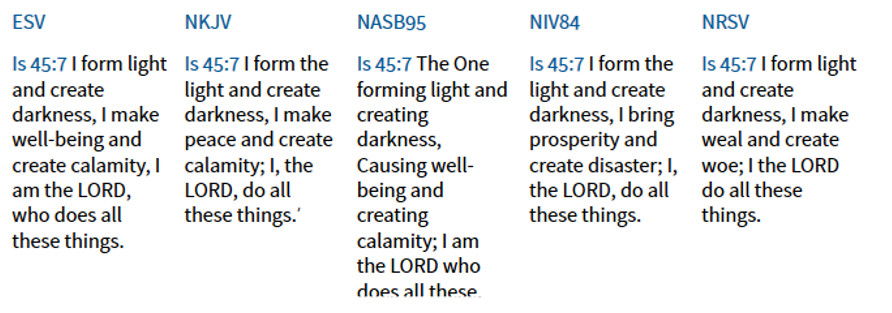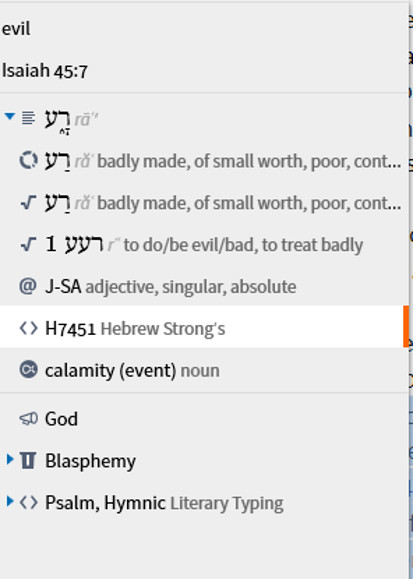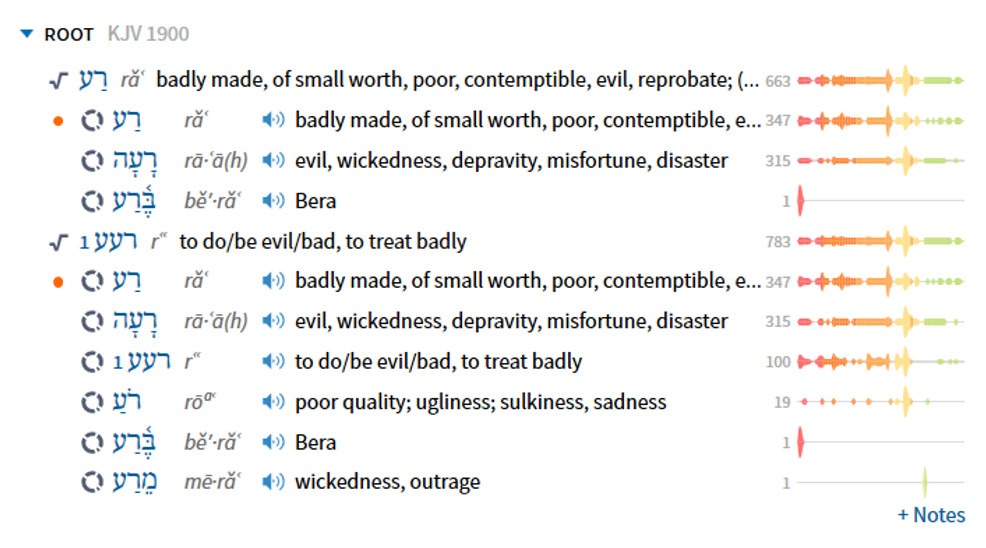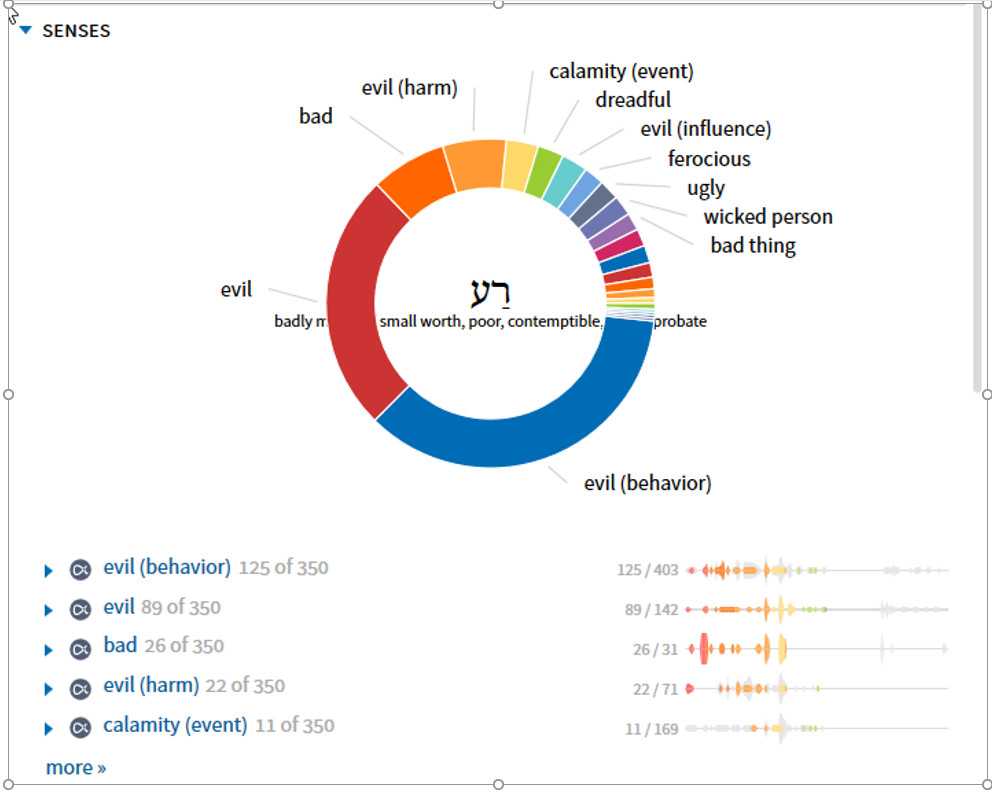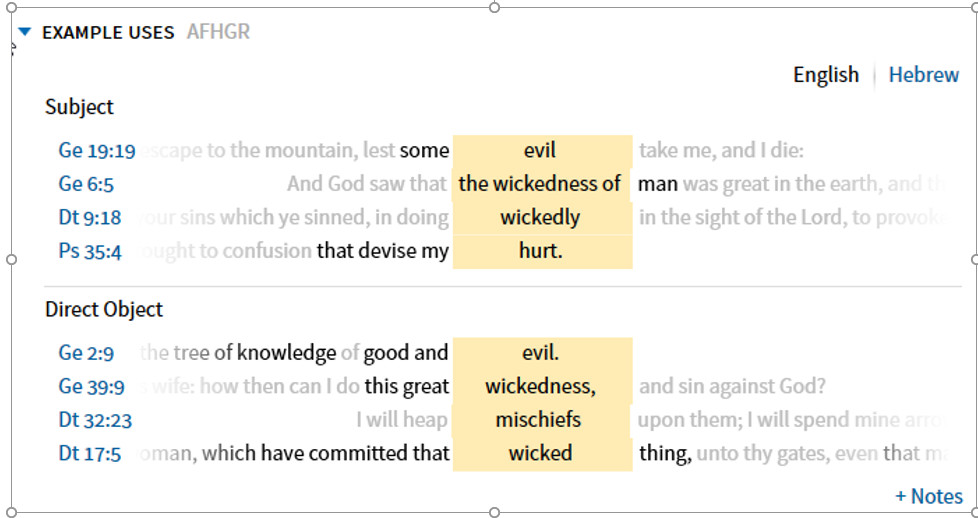Evil_Existance
- 2016-06-01
- By Editor
- Posted in Bible Questions Answered, Bible Study
Isaiah 45:7 – Question: Was evil a result of ‘sin’ (disobedience)?
This is an academic type of scriptural study allowing you to develop your answer to that question by utilizing various sources here and other sources at your disposal.
Isaiah 45:7 (ESV) 7 I form light and create darkness (H2822), I make well-being and create calamity (H7451), I am the LORD, who does all these things.
Isaiah 45:7 (KJV) The KJV uses the word “evil” and this can be miss application or understanding of how God is involved in “evil”. To “create” evil would indicate that evil wasn’t present until God created it. OR did ‘evil’ become because sin came into the world via Adam & Eve’s disobedience and thus perfection was lost. Was evil a result of ‘sin’ (disobedience)?
7 I form the light, and create darkness: I make peace, and create evil: I the LORD do all these things.
Isa457e
H2822. חשֶׁךְ chôshek, kho-shek´; from 2821; the dark; hence (lit.)) darkness; fig. misery, destruction, death, ignorance, sorrow, wickedness:—dark (-ness), night, obscurity.[1] (457compare)
I form the light, and create darkness: I make peace, and create evil: I the Lord do all these things.[2] The King James Version (457Kjv)
Look at the H7451 word found in both strips above.
H7451. רַע raʿ, rah; from 7489; bad or (as noun) evil (nat. or mor.):—adversity, affliction, bad, calamity, + displease (-ure), distress, evil ([-favouredness], man, thing), + exceedingly, × great, grief (-vous), harm, heavy, hurt (-ful), ill (favoured). + mark, mischief (-vous), misery, naught (-ty), noisome, + not please, sad (-ly), sore, sorrow, trouble, vex, wicked (-ly, -ness, one), worse (-st), wretchedness, wrong. [Incl. fem. רָעָה râʿâh; as adj. or noun.][3]
((457evil)
- רַע raʿ, rah; from 7489; bad or (as noun) evil (nat. or mor.):—adversity, affliction, bad, calamity, + displease (-ure), distress, evil ([-favouredness], man, thing), + exceedingly, × great, grief (-vous), harm, heavy, hurt (-ful), ill (favoured). + mark, mischief (-vous), misery, naught (-ty), noisome, + not please, sad (-ly), sore, sorrow, trouble, vex, wicked (-ly, -ness, one), worse (-st), wretchedness, wrong. [Incl. fem. רָעָה râʿâh; as adj. or noun.] CDWGTHB
New American Standard Quote:
Isaiah 45:7 returns to the introductory themes of 44:24. The prophet not only states that God is the one “who formed [yôṣēr] you” (44:24) but he “forms [yôṣēr] the light” and creates the darkness (44:7). J. D. W. Watts suggests that this choice of contrasts interacts with the dualism of the Persian religion, but R. N. Whybray and most others doubt that this is a polemic against Zoroastrianism. Since there is very limited knowledge of the development of the Zoroastrian religion at this time, it is safer to interpret these affirmations without contrasting them with Zoroastrianism. Light and darkness can be interpreted to be phenomena in nature that God created (Gen 1), but there is no indication in the creation account that God created darkness. Therefore, it may be best to relate these two phenomena to the realm of history where God is understood as the Lord of what happens on each new day and every night. The other comparative contrast is between the spheres of “peace” (šālôm, NIV “prosperity”) and “disaster” (rāʿ, NASB “calamity”; KJV “evil”). These are not abstract philosophical statements but practical claims about God’s control of everything that happens in history. The good times that bring peace, prosperity, and well-being are controlled by God and so are the terrible times when war, calamity, natural disasters, and death come upon people. God claims that he is the power and the director who “does, makes” all these things happen.[4]
“ra” is the Root and used here, however, other derivatives are found as noted below: “ra” is a part of many words – some 663 in this graph. (457Root)
(457Sense) Looking at the “Sense” of the Word involved & variations of root word. The large size in the wheel, the more scriptures with that word form. I.E. “evil (Behavior) shows to have 125/403 – 125 Xs out of the 403 found in Bible.
(457Uses)
Examples of the Uses of Word are:
Quote from: Answers to tough questions. Nashville: T. Nelson Publishers
The Scriptures make it plain that God did not create the world in the state in which it is now, but evil came as a result of the selfishness of man. The Bible says that God is a God of love and He desired to create a person and eventually a race that would love Him. But genuine love cannot exist unless freely given through free choice and will, and thus man was given the choice to accept God’s love or to reject it. This choice made the possibility of evil become very real. When Adam and Eve disobeyed God, they did not choose something God created, but, by their choice, they brought evil into the world. God is neither evil nor did He create evil. Man brought evil upon himself by selfishly choosing his own way apart from God’s way.
Because of the fall, the world now is abnormal. Things are not in the state that they should be in. Man, as a result of the fall, has been separated from God. Nature is not always kind to man and the animal world can also be his enemy. There is conflict between man and his fellow man. None of these conditions were true before the fall. Any solution that might be given to the problems mankind faces must take into consideration that the world as it stands now is not normal.
Although evil is here and it is real, it is also temporary. Evil will eventually be destroyed. This is the hope that the believer has. There is a new world coming in which there will be no more tears or pain because all things will be made new (Revelation 21:5). Paradise lost will be paradise regained. God will right every wrong and put away evil once for all, in His time.
Christians have a justification for fighting evil, immorality, and corruption. The world was not designed with evil in mind and the believer has a real basis for fighting social ills. He is not following the belief that whatever is, is right. The Christian does not condone wrongdoing by claiming it is God’s world, neither does he assume that everything that happens is agreed to by God. God does not desire evil nor does He ever condone it. He hates evil, and the Christian also is not only to despise evil, he is obligated to do something about it. Even though sin is real, it is not something that the believer accepts as the way things ought to be. By identifying with Jesus, the believer has a duty to call things wrong that are wrong and to speak out when evil is overtaking good. The Christian is not fighting against God by fighting social problems. Natural disasters, crime, and mental retardation should not be the accepted order of things, because they were never meant to be and they will not be in God’s future kingdom.
However, some people are still bothered that God even allows evil in the first place. They question His wisdom in giving man a choice in the matter. Dorothy Sayers put the problem of evil in the proper perspective: “For whatever reason God chose to make man as he is—limited and suffering and subject to sorrows and death—He had the honesty and the courage to take His own medicine. Whatever game He is playing with His creation, He has kept His own rules and played fair. He can exact nothing from man that He has not exacted from Himself. He has Himself gone through the whole of human experience, from the trivial irritations of family life and the cramping restrictions of hard work and lack of money to the worst horrors of pain and humiliation, defeat, despair and death. When He was a man, He played the man. He was born in poverty and died in disgrace and thought it well worth while” (Dorothy Sayers, Creed or Chaos? New York: Harcourt, Brace and Col, 1949, p.4).
The Bible tells us that God’s purposes are sometimes beyond our understanding. “‘For My thoughts are not your thoughts, neither are your ways My ways,’ declares the Lord. ‘For as the heavens are higher than the earth, so are My ways higher than your ways, and My thoughts than your thoughts’” (Isaiah 55:8, 9, NASB). Paul, in a similar vein, wrote to the church at Rome, “Oh, the depth of the riches both of the wisdom and knowledge of God! How unsearchable are His judgments and unfathomable His ways” (Romans 11:33, NASB).
Although the Bible informs us how and why evil came about, it does not tell us why God allowed it to happen. However, we do know that God is all-wise and all-knowing and that He has reasons for allowing things to happen that are beyond our comprehension.[5]
In Bakers Illustrated it states that He Hebrew perspective on good and evil was that God created and controlled them both.
While David is receiving the Spirit of the Lord, it departs from Saul. In fact, the language and juxtaposition of these statements in verses 13–14 suggest that the historian saw these events as simultaneous and related. Not only, though, does Saul lose the divine spirit; the Lord sends an evil spirit to torment him. (We must remember that the Hebrews’ perspective on good and evil was that God created and controlled them both; see Isa. 45:7.) Saul’s jealousy and depression are made worse because of the influence of this evil spirit, and at times it will drive Saul to violence (cf. 1 Sam. 18:10–11). According to verse 23, the evil spirit affects Saul sporadically.[6]
Baker New Testament Commentary on James & John states:
- When tempted, no one should say, “God is tempting me.” For God cannot be tempted by evil, nor does he tempt anyone;14. but each one is tempted when, by his own evil desire, he is dragged away and enticed. 15. Then, after desire has conceived, it gives birth to sin; and sin, when it is full-grown, gives birth to death.
The believer who passes the test is blessed, but the one who fails it is filled with remorse. The one who failed the test refuses to admit that he lacks faith in God. That is what Adam did in paradise when he fell into sin. He listened to Eve who in turn obeyed Satan. When God confronted them with their failure, Adam blamed Eve and Eve blamed the serpent (Gen. 3:12–13). In effect, Adam blamed God when he said, “The woman you put here with me—she gave me some fruit from the tree, and I ate it” (v. 12; italics added). No one should say, “God is tempting me.”
- “God cannot be tempted.” James is not interested in explaining the origin of evil, for he knows that not God but Satan is called the tempter. Therefore he writes, “God cannot be tempted by evil, nor does he tempt anyone.” He means to say that God, who created all things, is not the cause of evil. In his holiness God stands far above evil and cannot be influenced by it. James puts it this way: it is impossible for God to be tempted. Because of his perfection, God has no contact with evil, and evil is powerless to bring God into temptation.
Moreover, God does not tempt anyone. God hates evil and therefore does not lead anyone astray. “Do not say, ‘Because of the Lord I left the right way’; for he will not do what he hates. Do not say, ‘It was he who led me astray’; for he has no need of a sinful man” (Sir. 15:11–12).[7]
Believers Church Bible Commentary: Exodus states:
God and Evil: The Limits of the Subject
Our Exodus text makes two main assertions. First, it tells how God brings a series of ten terrible judgment signs on Pharaoh and Egypt on account of Pharaoh’s failure to acknowledge the LORD and let the LORD’s people, the Israelites, leave their enslavement. Second, God hardens Pharaoh’s “heart” (mind, understanding), albeit with Pharaoh’s own more or less voluntary participation. As a result, Pharaoh does not recognize the judgment signs (plagues) as signs from God, the only response that could save him from destruction.
This raises the twin questions of the origin of evil and the nature of God. How can there be evil powers, as represented by Pharaoh, in a world created by God? Has God created evil? Further, if God combats evil with evil (the plagues, the hardening of Pharaoh’s heart), does God not share in evil? It is unavoidable that such questions arise in our minds.
On the other hand, no human is capable of “solving” the problem of evil. Our minds are such that we cannot think of good without its opposite, evil; of friendship without enmity; of love without wrath; etc. The Bible itself does not explain the origin of evil, even though it has much to say on its nature and on our proper response to it. Instead, the Bible maintains the paradoxical affirmation that the world is subject to an all-powerful and good God, but that evil exists.
Our task here cannot be to enter broadly into the vast topic of God and the presence of evil. Instead, we must limit ourselves to certain aspects of this subject that are raised specifically by our Exodus text. We shall do this again, as in the last section, under two main headings: First, The Plagues; second, Pharaoh’s Hardening of Heart.[8]
A Bible Commentary in the Wesleyan Tradition – God created evil is a ‘gnosticism’ prognoses.
The “harsh treatment of the body” Paul mentions was asceticism, and it was a common element in the false teaching at both Colosse and Ephesus because the seeds of Gnosticism had been sown in both congregations. Gnosticism did not reach its fullest expression until the second century, but early Gnostic influences were already undermining the faith of these two churches.
Gnostics had a dualistic worldview. They believed in two gods who were in eternal conflict—a good god who reigned over the spiritual world, and an evil god who created and ruled the physical universe. Gnostics considered things of the spiritual world to be holy, but they treated all matter as evil. Because of their hostility toward anything material, Gnostics variously chose one of two different approaches to the human body, particularly with regard to food and sex.
The first approach was asceticism. Some Gnostics became ascetics or even hyperascetics, denying the “evil” body even the most basic appetites, needs, and comforts. They deprived the flesh to let the spirit soar.
The other approach was self-indulgence. Some Gnostics became libertines, living lives without moral restraint and engaging in all the sins of the flesh on the grounds that it didn’t matter what the body did since only the spirit would survive. Their behavior was often scandalous, but they boasted of their spiritual virtues.
The false teachers in Timothy’s church subscribed to the first view. Paul himself wrote often of the need for self-discipline—in fact, the later Gnostics loved to quote Paul selectively—but Paul had no patience with Gnostic practices because of the spurious theology behind them. (Gnostics never quoted 1 Timothy!) Paul affirmed self-denial but not spiritual masochism.
In response to the ascetics at Ephesus, Paul cites the very first chapter of the Bible. Although at first glance it appears that Paul is answering only the challenge to forbidden foods, his argument brilliantly covers the prohibition on marriage as well.[9]
John McArthur mentions “Gnosticism”:
The exact identity of the false teachers is unknown. That they were not second-century Gnostics is clear, since there is no evidence of the distinctive teachings of Gnosticism (such as a cosmological dualism with the transcendent good God opposed to the evil emanation who created the material world; the evil of the material world; salvation through a secret or hidden knowledge, etc.) in Jude’s description of them.[10]
The Baker Encyclopedia of Christian Apologetics that good was created, but man had free will to sin by choice.
God is good, and he created good creatures with a good power called free will. Unfortunately, they used this good power to bring evil into the universe by rebelling against their Creator. So evil did arise from good, not directly but indirectly, by the abuse of a good power called freedom. Freedom in itself is not evil. It is good to be free. But with freedom comes the possibility of evil. So God is responsible for making evil possible, but free creatures are responsible for making it actual.
Of course, other questions attach to this free choice solution to the origin of evil. One is, what caused the first creature to choose evil?
Theists distinguish between the primary cause of a free action (God) and the secondary cause (a human being). God gave the power of choice. However, God is not responsible for the exercise of that free choice to do evil. God does not perform the free action for us. Human free choice is not a mere instrumental cause through which God works. Human beings are the efficient, albeit secondary, cause of their own free actions. God produces the fact of free choice, but each human performs the act of free choice. God then is responsible for the possibility of evil, but we must bear the responsibility for the actuality of it. God neither wills evil to be done, nor wills it not to be done. He wills to permit evil to be done, and this is good.
But if God cannot will evil, then what is the cause of it? No action can be uncaused, since this violates the first principle of causality (see Causality, Principle of) that demands that every event has a cause.
To respond to this question it is necessary to unpack the nature of free choice. There are three basic views of the nature of free choice: In determinism, a free act is caused by another; in indeterminism, it is uncaused, and in self-determinism it is caused by oneself. Determinism would eliminate human responsibility, since another caused the action, not ourselves. Indeterminism is irrational, since a fundamental rule of reason is that every action has a cause. It follows, then, that every free choice must be self caused.
Of course, a person uses the power of free choice to make free choices. However, the person is not free choice. He simply has free choice. It is wrong to say I am free choice; I simply have free choice. So, I am the efficient cause of my own free actions, but the power of free choice is the means by which I freely act.
The Nature of Evil. There is another dimension to this difficulty. What is the nature of evil? That is, what is the essence or identity of evil? This too, is a particularly pesky problem for a classical theist (see Classical Apologetics). For God alone is eternal, and everything he created was good. What, then, is evil?
Theists reject dualism. Evil is not a coeternal principle outside of God. For not all opposites like good and evil are first principles. This wrongly assumes that just because something can be essentially good (God), something can be essentially bad. But once dualism is rejected, one has great difficulty explaining the reality of evil. If evil is not something outside of God, and it cannot be anything inside of God, then what is it? The problem can be summarized this way.[11]
Christian History Magazine – Issue96 – The Gnostic Hunger for Secret Knowledge.
Gnosticism Unmasked
The label “Gnosticism” is a fuzzy one, describing diverse sects and ideas in the ancient world. This chart summarizes those elements within various Gnostic groups that the majority of Christians found especially troublesome. A particular Gnostic sect would not necessarily have held all of the following beliefs.
| DOCTRINE – | GNOSTIC VIEW
|
ORTHODOX VIEW (as expressed by Irenaeus of Lyons)
|
| GOD
|
There are two opposing Gods: the supreme, spiritual, unknown Father who is distant from the world and revealed only by Christ; and the subordinate, ignorant, and evil creator of the world (Demiurge).
|
There is only one true God who is the Creator of the world and the Father of Jesus Christ.
|
| WORLD
|
The material world crafted by the Demiurge is evil and keeps the spiritual ones from perfection. It must perish and be escaped.
|
The material world was created good by God. It will someday be renewed and made into a fit home for the redeemed.
|
| HUMANITY
|
The Gnostics are by nature the elite, spiritual ones, for they have the “seed” of the spiritual realm inside them. This divine spark (the spirit) is trapped within the material, fleshly body and yearns for release from this evil dungeon.
|
God created all human beings as a union of body and spirit. We are not spiritual by nature—this is a gift available to all by faith through the ministry of the Holy Spirit.
|
| SALVATION
|
Only the immortal spirit of the Gnostic is saved as it gains release from material captivity and returns to the Father’s spiritual realm. Salvation is by knowledge (gnosis)—by knowing that the true God is the Father, not the Demiurge, and that the true home of the spirit is its place of origin, the Father’s realm, not the material world with its bodies of flesh.
|
Both the immaterial and material aspects of God’s creation are saved. By faith in Jesus Christ, a person receives the Holy Spirit who provides spiritual life, resurrects their flesh to eternal life, and redeems the created world.
|
| CHRIST
|
Christ is a spiritual, divine being from the Father’s realm who comes to the world to reveal the Father and the true identity of the spiritual ones, the Gnostics. Christ did not become incarnate or suffer on the cross. Instead, he either merely seemed to be human or temporarily inhabited a human being named “Jesus.”
|
Jesus Christ is the one and only Savior, the eternal Son of God made flesh, who truly suffered for the sins of humanity and was truly raised in immortal, incorruptible flesh for their resurrection to eternal life.
|
| CANON and HISTORY
|
There are gospels and testimonies of the apostles that convey the perfect revelation of Christ in addition to (and in some ways superior to) the church’s four gospels. This revelation brought by Christ manifests the true knowledge of the Father and the Gnostics, while the Law and the Prophets mamfest the Derniurge.
|
The church recognizes only four gospels, Matthew, Mark, Luke, and John, and believes that these four, along with the rest of the New Testament, are in harmony with the Law and the Prophets. All witness to the one true Creator and Father, his Son Jesus Christ, and the Holy Spirit.[12]
|
[1] Strong, J. (2009). A Concise Dictionary of the Words in the Greek Testament and The Hebrew Bible (Vol. 2, p. 44). Bellingham, WA: Logos Bible Software.
[2] The Holy Bible: King James Version. (2009). (Electronic Edition of the 1900 Authorized Version., Is 45:7). Bellingham, WA: Logos Research Systems, Inc.
[3] Strong, J. (2009). A Concise Dictionary of the Words in the Greek Testament and The Hebrew Bible (Vol. 2, p. 109). Bellingham, WA: Logos Bible Software.
[4] Smith, G. (2009). Isaiah 40-66 (Vol. 15B, pp. 257–258). Nashville, TN: Broadman & Holman Publishers.
[5] McDowell, J., & Stewart, D. D. (1993). Answers to tough questions. Nashville: T. Nelson Publishers.
[6] Burge, G. M., & Hill, A. E. (Eds.). (2012). The Baker Illustrated Bible Commentary (p. 276). Grand Rapids, MI: Baker Books.
[7] Kistemaker, S. J., & Hendriksen, W. (1953–2001). Exposition of James and the Epistles of John (Vol. 14, pp. 48–49). Grand Rapids: Baker Book House.
[8] Janzen, W. (2000). Exodus (pp. 142–143). Waterloo, ON; Scottdale, PA: Herald Press.
[9] Black, R., & McClung, R. (2004). 1 & 2 Timothy, Titus, Philemon: a commentary for bible students (pp. 91–92). Indianapolis, IN: Wesleyan Publishing House.
[10] MacArthur, J. F., Jr. (2005). 2 Peter and Jude (p. 144). Chicago: Moody Publishers.
[11] Geisler, N. L. (1999). In Baker encyclopedia of Christian apologetics (pp. 219–220). Grand Rapids, MI: Baker Books.
[12] Gnosticism Unmasked. (2007). Christian History Magazine-Issue 96: The Gnostic Hunger for Secret Knowledge.
Recent Posts
Archives
- April 2022
- February 2022
- November 2021
- October 2021
- August 2021
- July 2021
- May 2021
- April 2021
- September 2020
- August 2020
- June 2020
- March 2020
- February 2020
- November 2019
- October 2019
- September 2019
- August 2019
- July 2019
- June 2019
- May 2019
- January 2019
- December 2018
- October 2018
- August 2018
- June 2018
- February 2018
- January 2018
- December 2017
- November 2017
- January 2017
- December 2016
- November 2016
- October 2016
- September 2016
- August 2016
- July 2016
- June 2016
- May 2016
- April 2016
- March 2016
- February 2016
- January 2016
- December 2015
- November 2015
- September 2015
- August 2015
- June 2015
- January 2015
- December 2014
- November 2014
- October 2014
- September 2014
- August 2014
- July 2014
- June 2014
- May 2014
- April 2014
- March 2014
- February 2014
- January 2014
- December 2013
- November 2013
- October 2013
- September 2013
- August 2013
- July 2013
- June 2013
- May 2013
- April 2013
- February 2013
- January 2013
- December 2012
- November 2012
- October 2012
- September 2012
- August 2012
- July 2012
- August 2011
Categories
- Bible Discussion
- Bible Questions Answered
- Bible Study
- Bible Study Made Easy
- Bible Study Via Software
- Bible Topics
- Christ day and time
- Demo Articles
- Developing
- FP RokTabs #1
- FP RokTabs #2
- God's Amazing Convents
- History of the English Bible
- Home & Family
- Illustrations
- Manifestations
- Marriage
- Men
- Men in the Bible
- RokNewsFlash
- RokNewsPager
- RokStories
- Spirituality
- Sub RokTabs
- Uncategorized
- Various Articles/Topics
- Word
- Word Study


